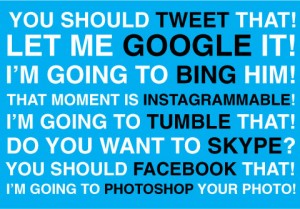During the last couple of years, an increasingly popular phenomenon has gained attention in the field of marketing – the verbing of business names.
One of the most notable examples is naturally Google, a word that is probably applied more often as a verb than a company name. While today many start-ups consciously opt for names that can later be easily turned into verbs as a part of their branding strategy, this has not always been the case.
In the past, companies were not particularly fond of the idea of verbing their brand names. They feared losing control of their brand, that one day the verb could become so general it would start to signal all the similar products in the market, distancing itself from its original meaning. Finally, you could end up with a genericised trademark and lose your legal protection, like happened with Aspirin, Thermos, Zipper or Butterscotch. Consider the case of Xerox, who put a lot of effort into encouraging its customers to ‘photocopy’ their papers instead of “xeroxing” them. While the company has somehow managed to preserve its trademark, there are now plenty of people who “xerox” their documents even on HP or Canon machines. Moreover, the meaning of the word has evolved even further, so when someone calls you a Xeroxer, it means you have probably been copying someone else’s style, ideas or possessions.
Do such developments still pose a real threat to companies? Presumably, but we have reached the point where businesses are increasingly starting to notice the benefits of verbing. First and foremost, it is one of the most effective means of extending brand recognition. Google was one of the first companies to take advantage of this, hoping that the popularity of “googling” would translate into more people opting for that particular search engine instead of its competitors. The Irish author Oscar Wilde has successfully managed to summarise the idea behind it into one sentence: “There is only one thing in the world worse than being talked about, and that is not being talked about.” Even Microsoft is trying to apply this knowledge to its search engine Bing – so next time you are looking for information, you might want to “bing” it instead of “googling” it. Or perhaps not. Bing has probably missed the train, since “googling” has already become too strongly associated with the process of using an Internet search engine, it might be a rather futile attempt to dethrone the word. More likely, people will eventually end up “googling” on Bing rather than “binging”. While the threat of losing their trademark is still there for Google – a triumph for Microsoft, no doubt –, the search engine has already benefited more from verbing than it could possibly lose in the future.
Why some businesses turn into verbs and others don’t?
This is not something that is thoroughly dependent on the company’s strategy. While you can choose a name whose characteristics give it greater potential to be verbed or encourage people to use your name as a verb, you normally cannot make this decision for them. More often than not companies with the most impact on human experience coin new verbs; therefore, what you are offering matters more than the features of the name itself. At first PayPal probably did not seem like the case for potential verbing, however, by now it is common to “paypal” money instead of shipping it.
Many company names have turned into verbs because the offered services or products have been revolutionary or innovative in some ways. Google benefited from the fact that beforehand there was no exact term to denote conducting an Internet search. The same happened with Skype. Xerox, on the other hand, probably caught on because earlier photocopying had not been exactly something you would do on a daily basis. Another aspect to the matter is that the verb should denote one particular activity. After all, despite the popularity, we still don’t Apple, PowerPoint, Excel or Novell. If you “powerpointed” something, what would you actually be doing? Creating a PowerPoint presentation? Conducting a PowerPoint presentation? Or maybe neither of those actions. And even if you actually used PowerPoint a lot, it isn’t really that common a topic that you would talk about often enough for it to become a verb.
Sometimes it does not even have to be the exact name of the business that is verbed. Consider Twitter and “tweeting”, a word singularly associated with the company and its website. Or what about “unfriend”? I dare say there is only one company this word can remind you of and while you may unfriend people in many social networking sites, we first think of Facebook. Consequently, in marketing it is not always important that the verb is the exact copy of your business name, while more attention should paid to having certain words associated with your company instead. So when someone mentions “followers”, no matter the context, your brain very likely registers “Twitter”, even if it is just for a second, and the next time you sit at your computer, the previous event makes you subconsciously go to the page and tweet something.
Which names are you using as verbs in everyday communication?

